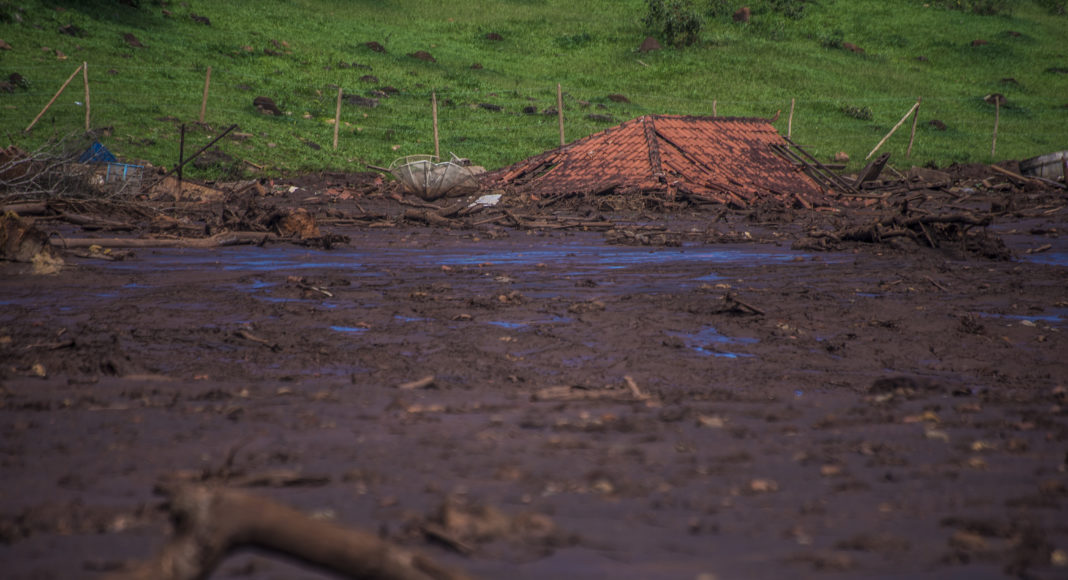This edited extract from a Christian Aid report, dated 11 June 2019, was prepared by LAB
When a dam at Vale SA’s iron ore mine collapsed in Córrego do Feijão in southeastern Brazil on 25 January, Christian Aid provided funding for local partner MAB (Movimento dos Atingidos por Baragens) to deliver urgent lifesaving assistance to families that were directly affected by the ‘tidal wave of sludge that devoured everything in a 5km path’.
It is estimated that 300–400 people are still missing, while at least 231 and possibly as many as 300 people have been killed. Corpses are still being identified 131 days after the disaster. Although the figures may appear low in comparison to major humanitarian crises elsewhere in the world, they conceal the extent to which whole ecosystems, livelihoods, and communities (both urban and rural) are profoundly affected. Meanwhile, most state authorities don’t appear to be particularly committed to defending the best interests of the affected population (a reality that mirrors that at nearby Mariana since the mining dam collapse there in November 2015).
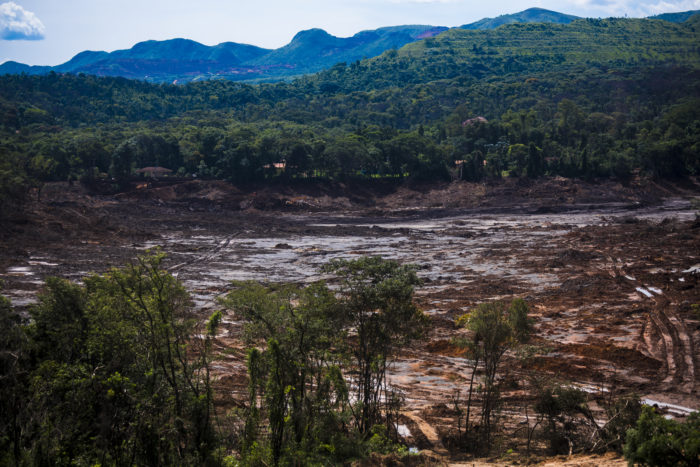
Company vs NGO
Christian Aid visited the area at the end of May to monitor progress and discuss with MAB the best way of improving and strengthening our response. Key conclusions that emerged from this visit are:
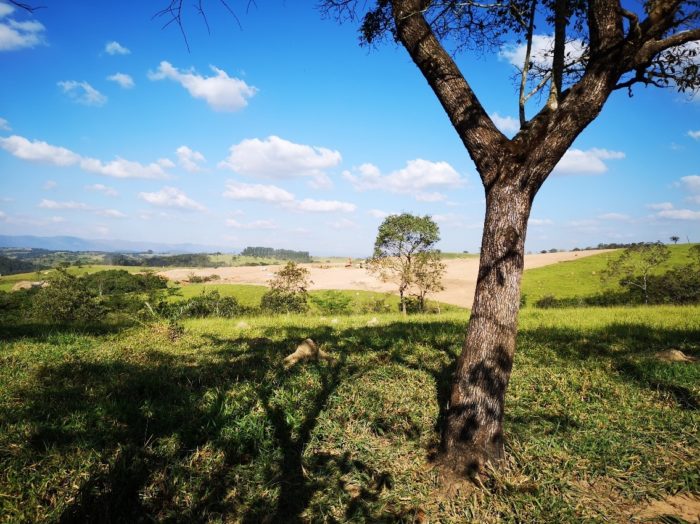
- The presence of companies such as Vale in rural communities has adverse effects long before a disaster, although these are less well-known. As well as increasing the risk of contamination and negative impacts on the environment and nearby communities, the mere presence of a mining or hydroelectric company interrupts local economies, customs, and livelihoods. MAB revealed that, prior to the disaster, Vale’s operations meant that many inhabitants near Córrego do Feijão opted to work directly for the company, whilst others had abandoned agricultural livelihoods for domestic work generated by Vale’s engineers. This trend contributes to a drop in agricultural production and local self-reliance.
- Although MAB was able to build on its experience and learning from the Mariana disaster, Vale too has shown skill in evolving its tactics to suit its own interests. For instance, some community members allege that during the first 48 hours after the Brumadinho disaster, Vale used helicopters to drop seeds resistant to industrial waste from mining – encouraging vegetation to grow and conceal the sludge and thus allow the company to claim that the ecosystem remains unaffected. Furthermore, a makeshift Vale-run water treatment plant was set up and an area of land on a hill untouched by the contaminated sludge was being cleared as a dump for sludge from the river banks – thus spreading the industrial waste under the guise of creating an ‘eco-park’ (see picture below).
- Rapid response efforts were undertaken mainly by brigades of firefighters as well as Brazil’s Civil Protection force. In Brazil, the Red Cross usually plays a smaller role in disasters caused by extractivist activity. However, in the case of Brumadinho, unverified testimony suggests that psychosocial and related assistance was delivered by some Red Cross personnel/volunteers/affiliates under contract to Vale, which may have compromised their neutrality and independence.
- Since relief was heavily regulated by Vale as well as Civil Protection officials, MAB did not find it as easy to overcome bureaucratic barriers and resistance to giving them full and immediate access to the affected areas and/or families. Such is the economic and political influence of Vale both in the state of Minas Gerais and at a national level, that there was no way to overcome this access barrier, especially given the absence of a strong humanitarian community in Brazil.
- For MAB, assistance in a disaster scenario such as the ones at Brumadinho and Mariana requires comprehensive geographical coverage. There are families that were directly affected by the tidal wave of sludge, while others were affected less directly due to the location of their households or community. While Vale prioritizes a relatively small number of households who were living closest to the iron ore mine, MAB takes into account all the communities and populations along the river Paraopeba which extends downstream for many kilometres before flowing into the San Francisco River, which is one of Brazil’s major sources of drinking water. As a result, MAB mobilizes a network of activists from across Brazil to ensure the widest geographical coverage possible across the whole area affected by the flow of the industrial waste through the river(s), by the rains and other environmental factors.
- Many MAB activists stressed that the presence of the sludge along the river banks and in the soils across the area would entail a high level of contamination over time among humans, animals, and produce. Indeed, it is unlikely that the population will be able to drink tap water in the short to medium term. Moreover, farmers will most likely not be able to generate the same income from their produce because of fears of contamination among the general population even in bigger cities such as Belo Horizonte or São Paulo. During Christian Aid’s field visit, the death of livestock was reported as were multiple instances of health-related symptoms among families affected by the sludge. Testimonies suggested that Vale and national authorities were downplaying or concealing these cases as much as possible to avoid potential backlash.
- MAB has an unique advantage in being a network with extensive reach in Brazil that is made up of people affected by dams. Thus MAB is both a Civil Society Organization (CSO) and a grassroots/community-based organization. In fact, most MAB activists who were involved with CA’s work at Brumadinho had themselves been affected by a dam at some time in their lives. As a result, MAB was able to help strengthen the social cohesion of the community by rapidly mobilizing communities and families, and develop leadership capacities for advocacy. Starting with small groups of families or community members and gradually building up to large-scale assemblies of 600 persons or more. As well as incorporating a faith-based approach, MAB’s knowledge and expertise in fighting the injustices committed by dam operators wins them trust as credible and independent allies.
- In an attempt to destabilize MAB’s community outreach campaigns and efforts, Vale adopts a ‘divide and rule’ or ‘quick win’ approach by intensifying its campaign to disburse compensation settlements to families they can win over; while denying assistance to individuals or collectives considered to be too closely associated with MAB, unless these can provide assurances to the contrary.
- Despite the numerous practical difficulties in the field, the Christian Aid grant allowed for the timely delivery of drinking water which was in short supply, food baskets, psychosocial accompaniment and improved access to the affected communities, both those in the immediate vicinity of the iron ore mine, and those further downstream.
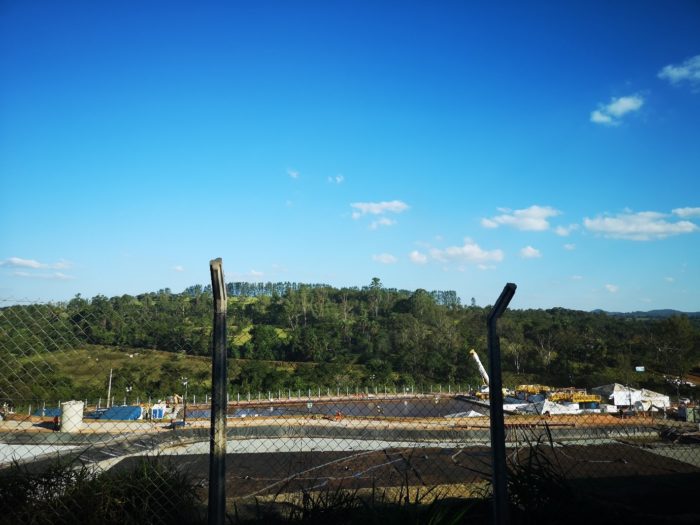
Two fundamental recommendations were made to MAB:
- MAB’s main hope is that the affected families obtain full compensation and have their rights protected as holistically as possible. However, the scale of the disasters in Mariana and Brumadinho and the contamination they produced, suggest that forced migration or displacement of families from the affected region may be inevitable. Thus, MAB may need to give more attention to developing an urban resilience strategy, to support families as they transition from the rural to the urban setting. This is especially required in some of the main cities of Brazil where violence and other hurdles are present. MAB already recognizes that a number of persons affected by mining disasters become alcoholics or eventually commit suicide (one case was reported during this field visit). These are factors that need to be taken into account when families from country areas are forced to move to a city.
- Greater attention needs to be given to the safety and security of MAB activists who are working on the frontline in the aftermath of a mining disaster and during the subsequent stages. The dangers of pollutants, prudent safety measures and equipment should be considered and expert advice sought. Staff should be provided with alternative means of communication (e.g., UHF, VHF, satellite phone, etc.) in areas lacking mobile signal or where mobile systems may have been damaged. At the same time, a clearer division of field roles and responsibilities is required. Finally, to strengthen the protection of MAB activists, the system of moving activists to other regions in cases where the person may be in danger should be strictly adhered.
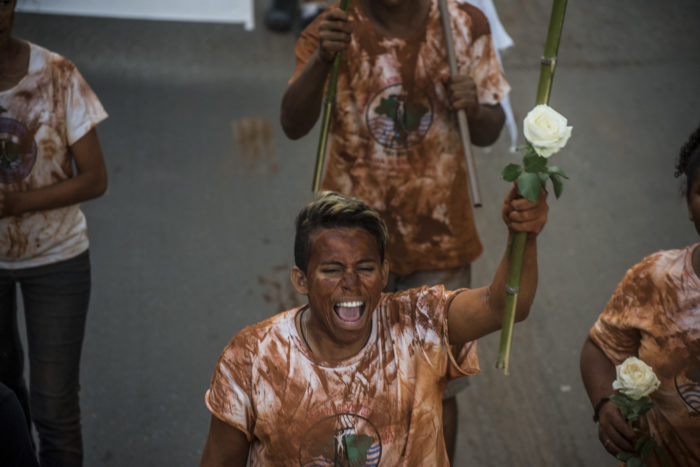
‘It’s surprising, the number of dams present in the state. There are more than 7,000 – they are a type of “bomb” that at any moment could explode’. —a MAB activist
In fact, at the time of HD’s visit to the Brumadinho, another Vale iron ore mine (Gongo Soco) was being closely watched by MAB, Vale, and relevant authorities as it was identified at risk of rupturing.
In a context of poorly regulated dams in Brazil and early warning systems that are entirely set up (where applicable) by companies such as Vale with very limited effectiveness and external oversight, we owe it to those affected, MAB in their everyday struggle for justice, and to all populations affected by the adverse effects of the extractivist industry to ensure the safeguarding of basic human and environmental rights before economic and political profit. Against companies such as Vale and ones like it around the world, every effort, every push, and every action is but a modest tribute to the broader struggle. However small our contribution may be, we need to make it count now more than ever.

